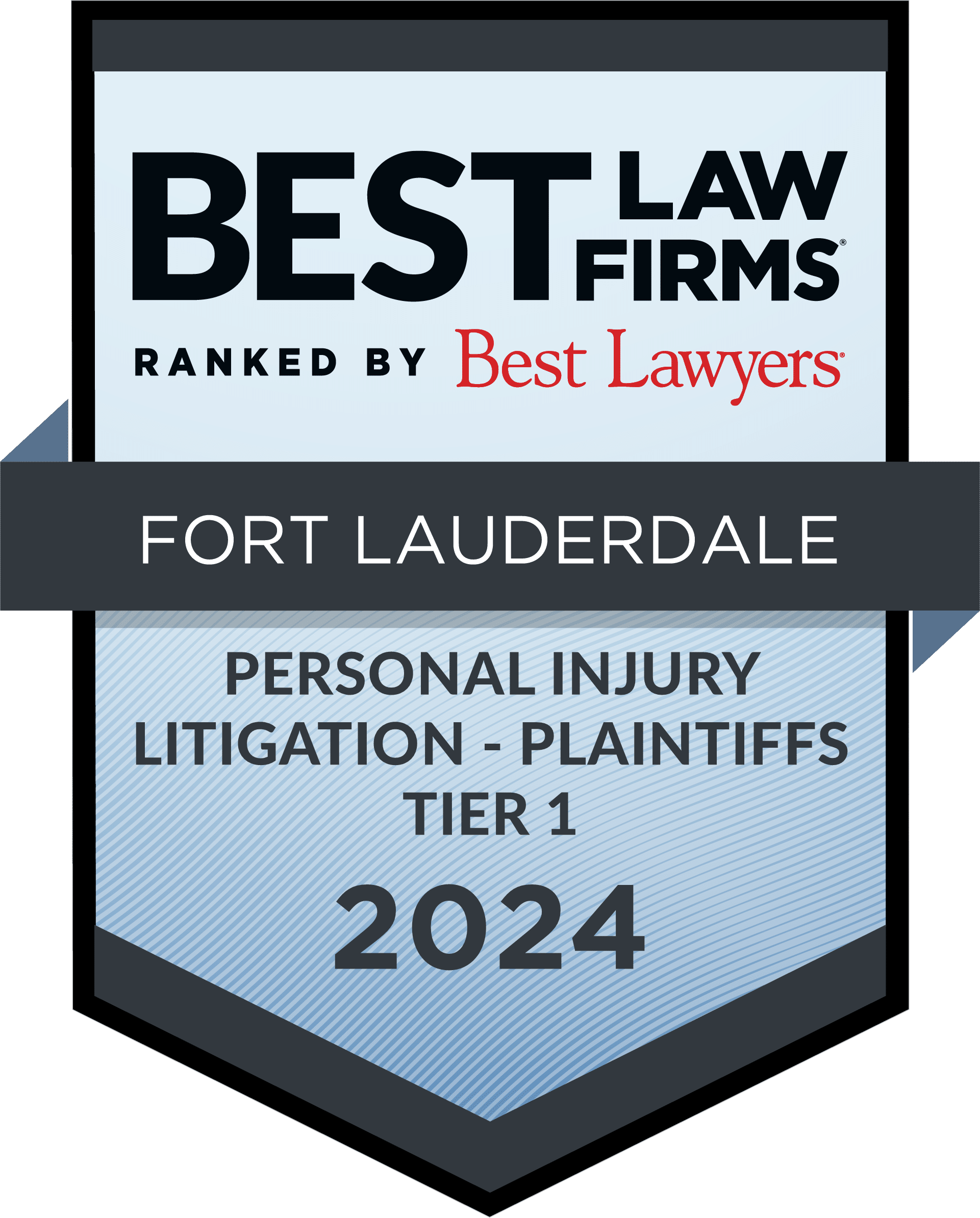Pharmacy and Medication Error Attorney
Healthcare workers are human and prone to error. Thus, medication errors happen—and it’s always tragic when they result in injury or death. Medication errors are serious and can result in adverse drug interactions, allergic reactions, overdoses, and other harm. If a medication error caused you disability, pain and suffering, medical expenses, or lost income, you may be entitled to compensation. Whether the party at fault is the pharmacy, doctor, or nurse, you have legal options in Florida with Freedland Harwin Valori Gander on your side.
Written and edited by our team of expert legal content writers and reviewed and approved by Daniel Harwin

- Content last updated on:

It’s entirely possible that if you’re a patient who takes medication, you have been or will be subject to a medication error at some point. Medication errors harm at least 1.5 million people annually, making it one of the most common medical errors. Between 7,000 and 9,000 people die each year from medication errors.
Getting medication from the provider’s prescription pad to the patient is a complicated process prone to errors at every step. A medication error can happen at the hands of the patient, the dispensing pharmacist, the prescribing medical provider, or the nurse or technician who administers the medication.
Not all medication errors are medical malpractice. An incident is considered malpractice when a health care provider fails to uphold the reasonable standard of care, and that failure harms the patient. Common types of medical malpractice include misdiagnosis, surgical errors, and birth injuries.
Pediatric errors are also a significant concern, as children may be more vulnerable to medication-related issues due to variations in metabolism, body weight, and developmental stages. Children often require careful consideration of age-appropriate dosages, as their bodies may process medications differently from adults.
When medication errors do happen, they can be devastating. Medication injuries can be disabling, and drug interactions or overdoses can lead to long-term harm or even death. The Florida medication error lawyers at Freedland Harwin Valori Gander can help you seek justice.
We have handled numerous cases involving both medication errors and inappropriate dosages of medications, including a patient who had a known severe allergy to penicillin that was given the medication and went into anaphylactic shock and died. The attorneys at our firm have also handled many cases involving pain medications and narcotics, and we recently obtained a 20.2 million dollar verdict on behalf of a family when their loved one was prescribed excessive dosages of Dilaudid and died from opioid-induced respiratory depression.
[Source: Medication Dispensing Errors and Prevention – StatPearls – NCBI Bookshelf ]
Medication Error Definition
The National Coordinating Council for Medication Error and Prevention defines medication errors as:
… any preventable event that may cause or lead to inappropriate medication use or patient harm, while the medication is in the control of the health care professional, patient, or consumer. Such events may be related to professional practice, health care products, procedures, and systems including: prescribing; order communication; product labeling, packaging and nomenclature; compounding; dispensing; distribution; administration; education; monitoring; and use.
A dispensing error is caused by the pharmacy or dispensary providing the medication. There are two types of dispensing errors: errors of commission, such as dispensing the wrong medication or the wrong dose, and errors of omission, such as failing to check for contraindications or medication interactions.
Administration errors are those caused by the health care providers prescribing or administering the medications or the patients themselves. For instance, a patient’s error might occur when they fail to give their provider a full list of the medications they were taking, leading to an adverse drug interaction. A provider’s error might occur when they fail to prescribe the right medication promptly.
While health care professionals are legally obligated to deliver error-free treatment, including prescribing and dispensing medication, errors still occur. When they happen, they can cause real damage.
The consequences of a medication error can include:
- Allergic reaction
- Overdose
- Drug injury
- Disability
- Medication interaction
[Source: Medication Errors | AMCP.org ]
Medication Error Examples
There are a lot of ways that administering medication can go wrong.
Some examples of medication errors in health care include:
- Giving the wrong medication: This can happen because a medication dispensing system was faulty, a prescription was illegible, an order contained an error, or a medication was improperly labeled.
- Administering the wrong dose: Receiving a dose that’s too high can put you at risk for drug injury or overdose, while too-small doses can cause harm by undertreating your medical problems.
- Using the wrong infusion rate: For intravenous medications, errors can occur when the infusion pump’s rate field isn’t properly updated.
- Dosing medications at the wrong time: When medication schedules depend on the availability of busy health care providers, doses may end up significantly early or late.
- Giving medication to the wrong patient: Providers who don’t verify identities before giving medications may make the critical error of giving medication to the wrong person.
- Administering medications incorrectly: Providers can cause injury by incorrectly setting up IVs for infusions or mistakenly giving intramuscular injections subcutaneously.
- Failing to check for drug allergies: Not cross-checking your history for medication allergies is a critical error by any health care provider, and it can result in serious life-threatening harm.
- Neglecting to check for interactions: Serious medication errors occur when a provider fails to check your medical history for current drugs that could cause a harmful interaction.
- Preparing medication improperly: Many specialty medications require refrigeration or have special steps, such as dilution, as part of the administration process. Skipping these steps can be harmful.
How To Prove Medication Errors
Proving medication errors in a lawsuit against a medical provider is a complex process that requires careful documentation and expert testimony.
To establish that your health care provider prescribed or administered the wrong medication or the wrong dose, you and your lawyer may need to provide the following key pieces of evidence:
- Medical records: These records should include details of your medical history, the condition being treated, the prescribed medication, and the dosage instructions. Discrepancies between what was prescribed and what was administered can be crucial in proving negligence.
- Prescription records: Obtain copies of the prescription records, including the written prescription itself and any electronic prescribing data. These records should clearly show the medication ordered, the dosage, and any specific instructions.
- Pharmacy records: Pharmacy records are essential in verifying the medication actually dispensed to you. They should include information on the medication, dosage, and any warnings or notes from the pharmacist regarding potential issues or interactions.
- Witness statements: If witnesses were present when the medication was administered, their statements could provide valuable evidence. These individuals could include nurses, other health care professionals, or even family members who can attest to what medication you received and any unusual reactions or concerns.
- Expert testimony: Medical malpractice cases usually rely on expert witnesses who can analyze the facts of the case and provide professional opinions. In medication error cases, experts might include pharmacologists, nurses, or physicians who can testify about the standard of care and how it was breached in your situation.
- Photographic evidence: If applicable, photos of the medication itself, such as pill bottles, labels, or medication packaging, can be used to demonstrate the discrepancies between what was prescribed and what was administered.
- Documentation of harm: To prove damages, you must document any harm or injuries resulting from the medication error. Such proof could include medical bills, records of additional treatment needed, and statements from health care providers about the consequences of the error.
- Hospital or facility policies: Familiarize yourself with the policies and procedures of the health care facility or provider involved. If they violated their protocols, it can strengthen your case.
- Other patient complaints: In some cases, discovering a pattern of medication errors involving the same provider or facility can strengthen your case. Research if other patients have brought similar complaints.
Proving medication errors can be challenging, and working closely with a skilled attorney experienced in medical malpractice cases is essential. They will gather and present the necessary evidence to establish the health care provider’s negligence and pursue compensation for the harm you’ve suffered.
Why You Should Hire Freedland, Harwin, Valori, Gander To Pursue a Medication Error Lawsuit
Freedland, Harwin, Valori, Gander has the experience and ability to handle the most complicated cases like medication error lawsuits. We’ve represented clients in cases like yours for over 20 years, recovering millions of dollars in damages.
Some of our high-profile results include the following:
- A $12.2 million pharmaceutical liability settlement for a family who lost a loved one due to side effects of a dangerous medication
- An $8.3 million pharmaceutical liability settlement for a woman who suffered permanent side effects from an improperly tested medication
- A $6.5 million medical malpractice settlement for the family of a man who died from respiratory arrest caused by an overprescribed pain medication
- A $2 million medical malpractice settlement for a man who suffered a serious stroke after his providers failed to give him the correct anticoagulation medications
Here’s what satisfied client Bill had to say about his experience with FHVG:
I met Dan (Harwin) about a year ago. He never made me feel that it was about the money. When he spoke with me he was asking how Bill (my brother) was and if he was doing better. He made me feel like family and always asked if I was alright. That means a lot. . . I would recommend [FHVG] to everybody because I really believe that they’re helping from their hearts. . . from a really good place.
Get Started on Your Medication Error Lawsuit Today
You need a skilled and experienced attorney to walk alongside you through the medical error lawsuit or pharmaceutical error lawsuit process. Freedland Harwin Valori Gander has been at the forefront of the medical malpractice field in Florida for decades. We can explain your legal options and evaluate how the statute of limitations applies to your case.
Put our 20+ years of experience to work for you. Call for a free consultation anytime, anywhere.

free consultation anytime, anywhere.
ALL FIELDS REQUIRED
- BIRTH TRAUMA
- EMERGENCY ROOM MISTAKES
- FAILURE TO DIAGNOSE OR MISDIAGNOSIS – CANCER
- FAILURE OR DELAY IN DIAGNOSIS OF SEPSIS
- FAILURE TO DIAGNOSE AND TREAT GESTATIONAL DIABETES
- FAILURE TO DIAGNOSE BREAST CANCER
- FAILURE TO DIAGNOSE HEART ATTACK
- FAILURE TO DIAGNOSE OR TREAT AORTIC DISSECTION
- FAILURE TO DIAGNOSE PNEUMONIA
- FAILURE TO DIAGNOSE PULMONARY EMBOLISM
- FAILURE TO TREAT STROKE
- HOSPITAL MALPRACTICE
- INTRAVENOUS INFILTRATION
- MEDICATION ERRORS
- MEDICATION OVERDOSE
- MISDIAGNOSIS
- NEGLIGENT FETAL MONITORING
- OB/GYN ERRORS
- PACU ERRORS
- PLASTIC SURGERY ERRORS
- PREOPERATIVE CLEARANCE ERROR
- PSYCHIATRIC MALPRACTICE
- RADIOLOGY ERRORS
- SPINE SURGERY MISTAKES
- STILLBIRTH & MISCARRIAGE MALPRACTICE
- SURGERY CENTER ERRORS
- SURGICAL ERRORS
CASE RESULTS
$24.5 Million
MEDICAL MALPRACTICE
JURY VERDICT
Damages Jury Verdict on behalf of the family of a 34-year-old woman who bled to death during childbirth. With the assistance of top experts, we were able to demonstrate that doctors did not follow proper safety protocols, forcing the defendants to admit liability shortly before trial.
$12.2 Million
PHARMACEUTICAL LIABILITY
SETTLEMENT
A settlement won on behalf of the family of a 47 year old woman whose death resulted from the use of a dangerous pharmaceutical drug. We proved the manufacturer knew of the dangerous side effects & did not provide proper warning.
$10 Million
BIRTH INJURY
SETTLEMENT
A settlement on behalf of a child who suffered a brain injury as a result of oxygen deprivation during birth. Through years of tactical and technical litigation, we were able to prove that the nurses and physicians both failed to intervene and prevent the brain injury.
$1.2 Million
MOTOR VEHICLE ACCIDENT
SETTLEMENT
A settlement on behalf of a middle-aged man who was read ended by a waste management truck.
$1.5 Million
NURSING HOME NEGLIGENCE
SETTLEMENT
A settlement on behalf of the family of an elderly man who died as a result of being neglected and uncared for by a nursing home.
TESTIMONIALS
I met Dan when I was in therapy and he came and right away it felt like a family member visiting you, a connection, like a brother. He’s been on both sides of the fence. He’s represented the hospitals and the doctors, and then he jumped over to the other side. It is a fantastic group, it was like Bell Belichick leading the team. They changed my life and still check on me. I recommend FHV to anybody and they thank me.
LARRY
I met Dan about a year ago. He never made me feel that it was about the money. When he spoke with me he was asking how Bill (my brother) was and if he was doing better. He made me feel like family and always asked if I was alright. That means a lot. Everyday is something new and I challenge for my brother. I would recommend [FHV] to everybody because I really believe that they’re helping from their hearts… from a really good place.
BILL
For anyone to represent anyone for 5 years and take the time to do it, not once just “get it out of the way” and “get it done with”. It was about what was best for Hunter and our family. It was about the case and the people.
ASHLEY
999 Ponce De Leon Blvd
Suite 1030
Coral Gables, FL 33134







